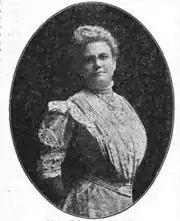Eliza Buckley Ingalls
Eliza Buckley Ingalls (August 24, 1848 – February 9, 1918) was an American temperance activist. Active in local and national activities of the Woman's Christian Temperance Union (WCTU), for twenty-seven years (1891-1918), Ingalls served as president of the federated white ribbon unions of St. Louis;[1] and for twenty years, as superintendent of the national union's Anti-Narcotics Department.[2]
Early years
Eliza ("Lide") Buckley was born at Cherry Hill Farm, 10 miles (16 km) south of St. Louis, Missouri, August 24, 1848,[3][2] where the early years of her life were spent.[4]
Career
In 1880, she married Fred H. Ingalls, a successful merchant in St. Louis, Missouri.[4]
"Work against other narcotics has gone steadily on, but the cigarette habit is of such great importance that other things seem to sink almost into insignificance." -Eliza B. Ingalls[5]
She was an active temperance worker since she was a child, having joined the order of Good Templars when only fourteen years of age. She served as superintendent of the anti-narcotics department of the National WCTU.[6] Her special mission was the eradication of tobacco in all forms. She was assisted in her work by State superintendents, and the results were shown by the enactment of laws in nearly every State in the Union prohibiting the sale of tobacco to minors.[4] She was determined and aggressive, holding to a strict accountability for each one to whom a task was assigned. She served as vice-president of the Missouri W. C. T. U. when Clara Cleghorn Hoffman was its president and was long the National WCTU superintendent of Anti-Narcotics. Much of Missouri's legislation upon the subject was due to her efforts. Contemporaries whom she entertained at her home included Frances E. Willard, Lady Henry Somerset, and Anna A. Gordon.[1]
Death

Her last message to the women of the St. Louis WCTU, a few days before she died, was typical of her nature: "Give the women my love and tell them to push on." Ingalls died February 9, 1918,[3] after a continued illness of almost three years. Nelle G. Burger wrote Ingalls' obituary in The Union Signal.[1]
References
- National Woman's Christian Temperance Union 1918, p. 50.
- Willard 1995, p. 402.
- Cherrington 1926, p. 1324.
- Willard & Livermore 1893, p. 410.
- Tate 2000, p. 31.
- Woman's Christian Temperance Union 1908, p. 27.
Attribution
 This article incorporates text from this source, which is in the public domain: National Woman's Christian Temperance Union (1918). "Mrs. Eliza B. Ingalls, for Many Years a National Worker, Summoned Home, by Nellie G. Burger". The Union Signal: A Journal of Social Welfare. Vol. 45–46 (Public domain ed.). National Woman's Christian Temperance Union.
This article incorporates text from this source, which is in the public domain: National Woman's Christian Temperance Union (1918). "Mrs. Eliza B. Ingalls, for Many Years a National Worker, Summoned Home, by Nellie G. Burger". The Union Signal: A Journal of Social Welfare. Vol. 45–46 (Public domain ed.). National Woman's Christian Temperance Union. This article incorporates text from this source, which is in the public domain: Willard, Frances Elizabeth; Livermore, Mary Ashton Rice (1893). A Woman of the Century: Fourteen Hundred-seventy Biographical Sketches Accompanied by Portraits of Leading American Women in All Walks of Life (Public domain ed.). Moulton. p. 410.
This article incorporates text from this source, which is in the public domain: Willard, Frances Elizabeth; Livermore, Mary Ashton Rice (1893). A Woman of the Century: Fourteen Hundred-seventy Biographical Sketches Accompanied by Portraits of Leading American Women in All Walks of Life (Public domain ed.). Moulton. p. 410. This article incorporates text from this source, which is in the public domain: Woman's Christian Temperance Union (1908). Report of ... Annual Convention of the National Woman's Christian Temperance Union. Vol. 35, Parts 1908-1909 (Public domain ed.). Woman's Temperance Publishing Association.
This article incorporates text from this source, which is in the public domain: Woman's Christian Temperance Union (1908). Report of ... Annual Convention of the National Woman's Christian Temperance Union. Vol. 35, Parts 1908-1909 (Public domain ed.). Woman's Temperance Publishing Association.
Bibliography
- Cherrington, Ernest Hurst (1926). Standard Encyclopedia of the Alcohol Problem. American Issue Publishing Company.
- Tate, Cassandra (June 2000). Cigarette Wars: The Triumph of the Little White Slaver. Oxford University Press. ISBN 978-0-19-514061-3.
- Willard, Frances Elizabeth (1995). Writing Out My Heart: Selections from the Journal of Frances E. Willard, 1855-96. University of Illinois Press. p. 402. ISBN 978-0-252-02139-8.
External links
 Works related to Woman of the Century/Eliza B. Ingalls at Wikisource
Works related to Woman of the Century/Eliza B. Ingalls at Wikisource- Works by or about Eliza Buckley Ingalls at Internet Archive
.jpg.webp)